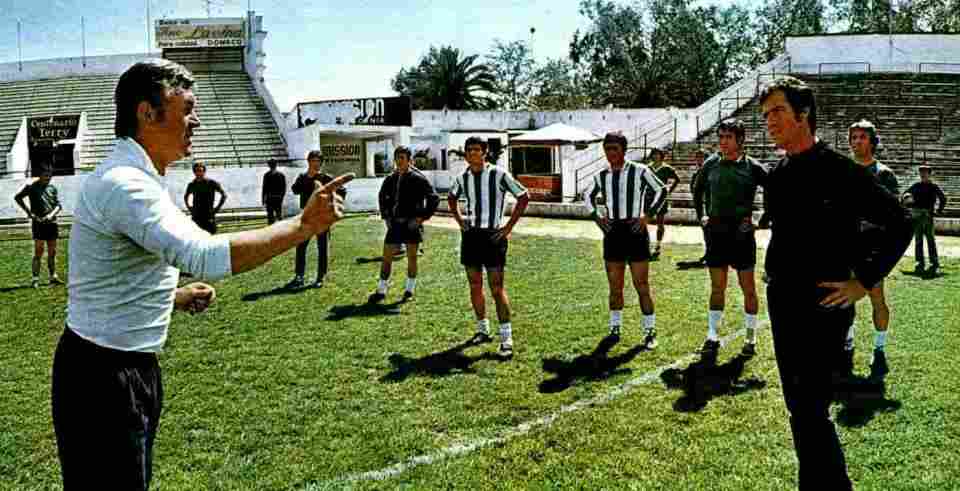
HISTORY / Pesudo, the goalkeeper who was already retired
In 1972, Real Betis signed this keeper, who had been a great in Valencia and Barcelona, even if he had been more than a year without playing
By Manolo Rodríguez
Real Betis and Valencia have shared a large number of players. It has been quite common to see Green and White footballers transferred to the club from Mestalla and the other way around, too.
The most significant cases are, without a doubt, Quino and Joaquín, two Real Betis greats who left the Club to go to Valencia. Both sold for quite a lot of money for the moment. Quino in 1971 and Joaquín in 2006.
In this chapter, it is also necessary to include other footballers such as Fernando Ansola, a great goal scorer, and Antón, a great left back, who, in 1966 and 1969 respectively, where transferred to Mestalla for 4 and 5 million Pesetas. A good amount for that time, especially considering the awful economic situation Real Betis was in.
Before playing for Betis, some players were in Valencia and later made history as Green and Whites: Esteban Areta, Jorge Vila, Carlos Diarte, Ricardo Oliveira or Sergio Canales.
There are lots of examples of players who spent time in both teams (Barragán, Otero, Gálvez, Xisco, Machicha, etc) but there is one who outstands because how exceptional and unexpected his signing was.
We are talking about José Manuel Pesudo, a goalkeeper that, since 1958, had been great in Valencia. He spent three seasons there before been transferred to FC Barcelona.
He spent two seasons at Barcelona before moving back to Valencia in 1966, and stayed there for another five seasons.
Pesudo was known for his large size, his concentration and lack of mistakes. A safe keeper who was a reference among Spanish goalkeepers for some time.
But in 1970, aged 34, Pesudo had lost his spot in the starting eleven in Valencia. He wasn't playing anymore, even he had a well-established name. So much that, in December of that year, Real Madrid tried to sign him due to the many injuries they had. He arrived to the capital and did a trial under the supervision of coach Miguel Muñoz, who stated that the keeper was "in perfect shape". However, he underwent medical tests by Real Madrid doctors who said that had found sequels of an old shoulder injury. For this reason, Madrid finally did not sign Pesudo.
That situation was trending topic in the sport media back then. A scandal, some said. Pesudo went back to Mestalla and his contract was terminated at the end of the season.
He then decided to retire and went back to his hometown, Almassora, in Castellón. He started to work in the family business when Betis went looking for him. A big surprise for everyone.
This happened in February of 1972, just a month after the Hungarian Ferenc Szusza had taken charge of the Green and White team. An unknown coach that brought new methods and that immediately worried by the fact that the two goalkeepers the team had were really young. One was Manolo Campos, the first choice since the season had started; and the other was Trigueros, who had not played a single minute yet.
For this reason, Szusza asked president Núñez to sign a veteran goalkeeper. The Club searched the market but could not find a single candidate who was playing. And went for Pesudo even if he had not played an official match for more than a year.
He signed for Real Betis on the 10th of February of 1972 in exchange of a monthly salary until the end of the season and a bonus for the number of games played. As it is natural, the press back then asked him about the supposed injury that prevented him for signing for Real Madrid and the players answered: "It seems to be a congenital issue. One of my collar bones is shorter than the other, but this has never been an issue for me to play a good level."
Pesudo successfully underwent medical tests at Betis and one day later he was training under Szusza. He said that he had continued training and playing tennis in his hometown and that he currently weighed 81 kilograms while he weighed 80 when he was still playing.
Pesudo made his debut with Real Betis on the 1st of March of 1972 in a Copa del Rey match in Alicante and played a total of 5 matches until the end of the season. One of them was a derby with that infamous moment when he had a misunderstood with centre back Paco Telechía that provoked the tie for Sevilla.
However, he did quite well in some matches. He was key to get a point in Coruña. And Burgos where, after two great saves, he had to leave the pitch injured after a clash with a rival. He had to be admitted in the hospital and spent there 48 hours.
That victory in Burgos was essential for Betis to stay in the top division. A game, by the way, when all the Betis luggage was stolen. On Sunday, matchday, all the players' boots were found by the River Almazón. All of them except the ones belonging to González Cassasas and Benítez, who had to play with borrowed shoes.
At the end of the season, Szusza was happy with Pesudo. And he was presented a renewal proposal. The teammates spoke highly of him and, even today, Paco Bizcocho, who was just 20 at the time, remembers him as a great professional who looked after himself and who gave great advice to the youngsters. However, "he used to smoke a cigarette in the dressing room before every match." Something that was pretty common back then, though.
In the 1972/73 season, Pesudo played more than in his first season. Almost four times more. He was in the team in the first and last match, and was quite brilliant in happy days such as the games at Bernabéu and San Mamés. The fans get used to his routine of not looking when his team was about to take a penalty and he always seemed calm even in tougher times.
However, Betis got relegated and his time at Heliópolis ended. And Esnaola arrived soon, the greatest Green and White keeper. Pesudo played for another year in Second Division with Nastic Tarragona and then retired from football.
He passed away in Valencia on the 5th of December of 2003, aged 67. His widow told me not long ago that he always fondly remembered his time at Betis. "There are some things that you just can't forget," he used to say. "And Betis is one of them."





